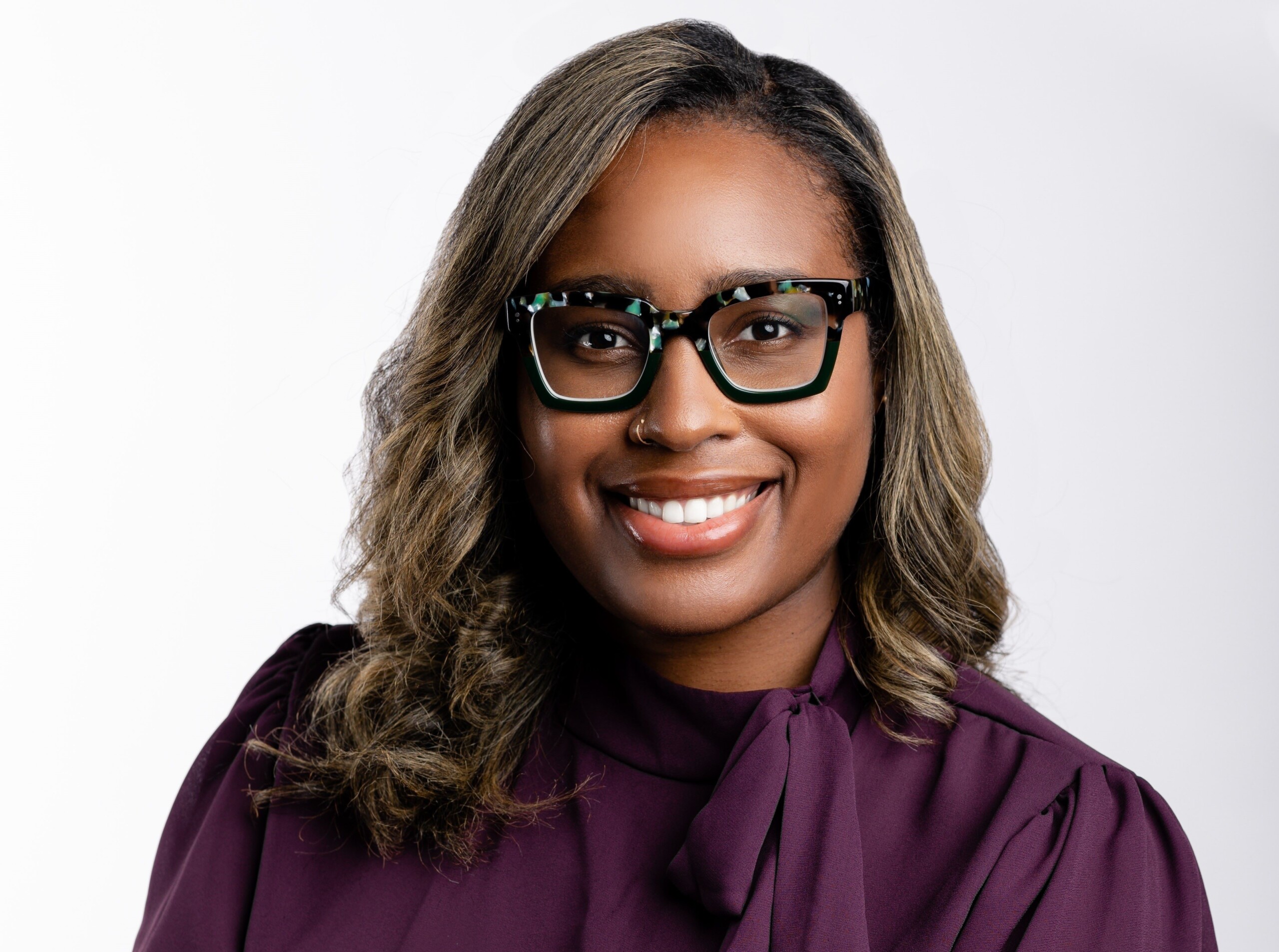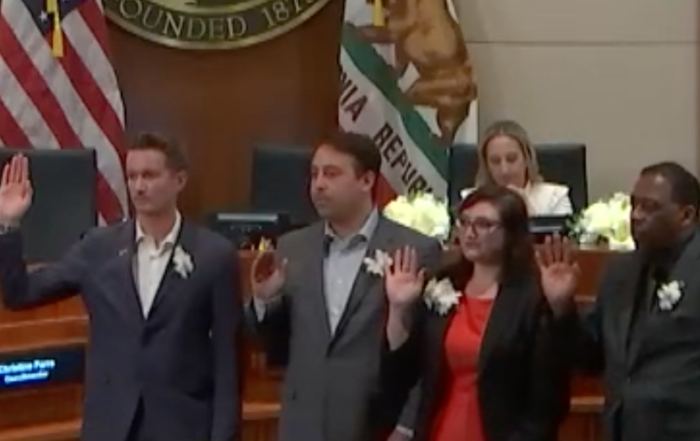As an African American woman, Yasmine-Imani McMorrin knows the importance of a person feeling they matter to a community.
McMorrin enters the Culver City Council race as one of two incumbents and is looking to continue history as the first African American woman to serve on the council. Serving as the Director of Education Equity for Children’s Defense Fund California by day, she believes that balancing the needs of all residents through data — not just the loudest or most affluent — is the key to a more equitable and better city.
“Making sure that people feel seen and heard and feel like they belong is really important to me,” McMorrin told Westside Voice.
Many of McMorrin’s priorities are things that she believes she has demonstrated throughout her first term on the council. She believes in approaching issues with a data-driven mindset, using that data to inform decisions, and answering questions from the public on those decisions.
Along with that information, representing the voices that aren’t able to speak up at council meetings and that are normally underrepresented has driven McMorrin’s decisions since she was first elected. She recently abstained on voting for zoning changes despite needing to pass them to comply with state law because she believes it brings an unfair burden to Fox Hills — the neighborhood McMorrin has lived in since 2020.
“There was a conscious decision made to place additional housing units in a neighborhood that is already the densest,” McMorrin said. “I feel that the zoning that disproportionately places 100 dwelling units per acre in Fox Hills is not taking into account the historical context of Culver City being a sundown town.”
To address the housing crisis that played a significant role in the zoning changes around Fox Hills, McMorrin believes in a housing-first approach that treats people with as much dignity as possible. She supports the motel leasing program and similar endeavors and is working on a Safe Parking program in conjunction with a leased motel site.
“I feel that I don’t want to provide for someone else, anything that I wouldn’t want to accept,” McMorrin said.
McMorrin has been an outspoken supporter of rent control, arguing that keeping rents limited is a form of homelessness prevention. These processes are a two-way street, and while McMorrin acknowledges that guardrails for landlords are also important, argues that tools like anti-discrimination measures are important to protect tenants.
Like other things, data is a key part of her approach to the housing crisis, and she hopes to continue using it to inform her agenda. She believes in the importance of both the rental registry which is now in its second year of use and using metrics on the unhoused population to gauge success.
“I am all about ensuring that folks remain housed and that we do all that we can to support that, while making sure that we are data-driven as much as possible,” McMorrin said.
Similarly to housing, McMorrin argues there is not a quick-fix solution for the homelessness crisis. She praised the efforts of previous council members including Meghan Sahli-Wells, Thomas Small, and Alex Fisch, but argued that many of the decisions her peers have made like dissolving the Housing and Homelessness Subcommittee earlier this year reflect their desire for an easy resolution.
“Despite feeling like this is an emergency, they did not feel like they needed a subcommittee to be dedicated to housing and homelessness,” McMorrin explained, “which I think is incredibly disappointing.”
McMorin believes in treating people with respect, including those in dire straits. She supports finding unhoused residents shelter through programs like Project Homekey and says she worked with Fisch to identify potential locations for Safe Parking, Safe Sleep, or permanent housing sites.
For those who are not fortunate enough to be able to participate in these highly desired programs, McMorrin believes in treating them with the respect and dignity a person deserves.
“I think it’s a little hypocritical to say that people cannot have tents in Culver City, but can have a tent in the specific site that the city designates,” McMorrin said. “There is a real issue of dehumanization of our neighbors.”
She argued that many unhoused residents are going through a myriad of potential issues like suffering from PTSD and deserve to be treated with care, not scorn. One of these factors is domestic violence, which McMorrin herself is a survivor of.
More resources for domestic violence victims could help prevent incidents and give safe spaces to those who have been attacked, McMorrin argues. Domestic violence calls can be some of the most dangerous, so education and prevention would also relieve some of the burden currently on law enforcement.
“A lot of the domestic violence calls or incidents that happen involve gun safety and gun violence,” McMorrin noted.
As the daughter of a police detective and African American woman, McMorrin has a unique vantage point on the relationship between the Culver City Police Department and the residents they serve.
“I’ve never said that we should not have a role for law enforcement,” McMorrin explained. “I do believe that we should have a mechanism that provides a high quality of service where everyone who interacts with the service is treated with respect.”
However, she is concerned that the police almost always receive bumps to their budget each year. Since the 2014-15 fiscal year, the police budget only decreased year-over-year during the 2020-21 fiscal year at the heart of the COVID-19 pandemic. That year, the police budget was cut by about 6 percent in 2020/21, a small amount compared to the entire budget which was 20.5 percent smaller.
McMorrin argues that these increases could be put into more progressive solutions like the city’s Mobile Crisis Team — which McMorrin campaigned on in 2020 — instead of continuing to push the police’s technological arsenal.
“It’s not really a matter of defunding,” McMorrin said, “but it is how we’re using our community resources right now, and how can we potentially use them better?”
These aren’t just political talking points; people in the community have raised concerns, and McMorrin believes it is crucial to be responsive to the concerns community members bring to the table.
As part of the General Plan process, a section on reimagining public safety was included that outlined ways to shift responsibilities from the police to more holistic solutions, but this piece was singled out for removal by the current council majority.
“Those were 1000s of community members who had offered their opinion, their experience, with the hope that our council and our community would take their input seriously,” McMorrin said of the Reimagining Public Safety section.
While McMorrin acknowledges CCPD taking the initiative in reporting data required by the Racial and Identity Profiling Act of 2015, she notes that the data still shows a disproportionate amount of uses of force on Black and Brown people and the lack of attention brought to it.
“There doesn’t seem to be a plan that I know of to address that disproportionality,” McMorrin said.
Data from the city also brought clarity to a controversial topic: the MOVE Culver City project was a success. The city had a study done in April 2023 at the end of the pilot period which showed that the project brought increases in cycling and public transit ridership with minimal average changes to vehicle travel time in the Downtown corridor.
She acknowledged the difficulty that comes with changes — particularly those related to vehicle traffic — but believes that following the data will be important to help accommodate the 2028 Olympics among other upcoming activities.
“We know that we are going to be dealing with a lot of traffic, and we know just intuitively that there are limits to cars being the solution to our transportation goals,” McMorrin said, “So, what are folks willing to do?”
While she hopes to balance the needs of all modes of transportation in the coming years, she cannot help but prioritize the safety of those most vulnerable to traffic violence.
“Knowing the data that we have in L.A. County and Culver City on pedestrian safety or bicycling safety or transit, we have to focus there,” McMorrin argues.
Advocating for those with less impactful or influential voices like the many residents who plead to keep MOVE Culver City intact is what McMorrin has always done and hopes to continue to do in a second term on the council. As a woman and a progressive voice, she hopes that she leaves a better Culver City than she found for her daughter.
“I have to be focused on how I make this community a better world for my daughter,” McMorrin said, “and the children of Culver City.”
Photo courtesy of the McMorrin campaign.
Stay informed. Sign up for The Westside Voice Newsletter
By clicking submit, you agree to share your email address with Westside Voice. We do not sell or share your information with anyone.








